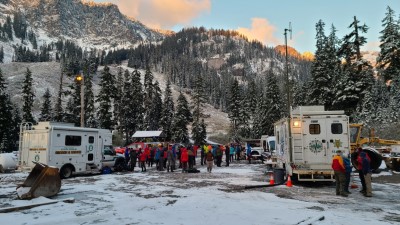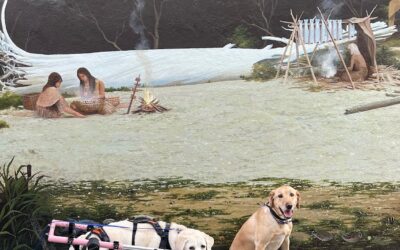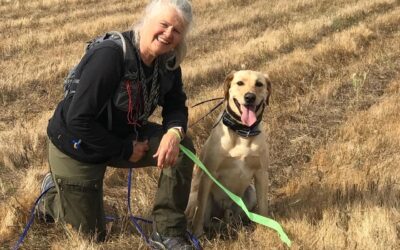Hike Your Own Hike
“Which of you men, if you had one hundred sheep, and lost one of them, wouldn’t leave the ninety-nine in the wilderness, and go after the one that was lost, until he found it?” The Gospel of Luke
“Hike your own hike.”
It’s a phrase you see fairly often in social media groups devoted to hiking or outdoors activities.
And I have a problem with it.
At its best, it’s a facile recommendation not to criticize other hikers for their choices in fashion, goals, dietary preferences, or velocity on the trail.
But there’s an insidious side of “hike your own hike” that needs to be recognized and thought about, because it can lead to a denial of personal responsibility.
A few years ago, I presented a hiking safety talk to a business group. During the talk, I stressed the importance of carrying the Ten Essentials and also carrying a cellphone. In the Q&A session at the end, one young man stood up and volunteered that he never took his cellphone with him on hikes, because he didn’t want anyone to come looking for him if he got lost or injured.
I admit I was so stunned by this remark that I didn’t have a coherent response at the time. But I kept thinking about what he’d said, and finally realized that what he was missing was a basic understanding of personal responsibility in a connected society.
So let’s talk about this.
With very few exceptions (think Robinson Crusoe without Friday), everyone on the planet is part of an interconnected social web. If you get lost in the wilderness, whether you know it or not, whether you think about it or not, whether you want it or not, someone is going to look for you.
In our country, what this means is that a sheriff or ranger will be diverted from other public safety duties to organize a search. In our country, a search means that SAR volunteers will leave their families or jobs, drive miles to the scene, and put themselves at risk as they search in the dark and bad weather through rough terrain for hours, after spending their personal money on gas, clothing, and equipment.
It’s important to re-state this point: SAR volunteers will put themselves at risk and incur personal financial costs if your “hike your own hike” ignores the concept of personal responsibility in a connected society.
Let’s close by considering what personal responsibility looks like for hikers:
- First, understand that you are sharing your risk out to others. Just a few years ago during a night search in a neighboring county, a searcher took one small step off a narrow trail and fell to his death. I was on the team that recovered his body the next morning. Hikers (and other wilderness travelers) need to know that if you get lost or injured, other people are going to mobilize for search and rescue and they will be putting themselves at risk.
- Be prepared for the unexpected (carry the 10 Essentials, and more). Last year a hiker was lost for several days in Olympic National Park. Despite the fact that she was carrying most of her backpacking gear, after 3 days in the rain, all of her clothes and her sleeping bag were soaking wet and she almost perished from hypothermia. The recent popularity of “ultralight” hiking or “slackpacking” can result in hikers who are light both in personal responsibility and in gear needed for unexpected survival challenges .
- Let someone know where you plan to travel. In June of 2020 a 25-year-old male with limited outdoor experience was reported missing. A day later, his car was located in Mount Rainier National Park near a junction of five major trail systems. He had left no information about what his hiking plan was. Despite multiple days of searching, he was never found. If you don’t communicate your hike plan (and stick to it), two things can happen: (1) The search for you is delayed until more information becomes available and (2) search efforts (and limited search resources) are diluted across multiple areas or trail systems.
- Carry a fully-charged cellphone. Recently a young woman was lost in the forests of Maui for over two weeks. The area in which she was found was remote, but had cell phone coverage. She had left her cellphone behind in her car (on purpose). The lesson is pretty clear here: Not carrying a cellphone puts you at risk. Not carrying a cellphone puts others at risk by unnecessarily extending search efforts.
- Be ready to help SAR find you. Just last year there was an extended search for a missing solo hiker. He was wearing camo clothing when found deceased. Imagine how hard it was for SAR searchers to locate him. In recent years it’s become fashionable to wear black or dark outer layers – which make you all-but-invisible to searchers. The longer that SAR needs to look for you, the longer they are at risk themselves. On your next trip to the outdoor supply store, ask yourself: “What color would I want to be wearing if I were lost or injured in the wilderness?”
So, when you next set out to “hike your own hike,” it’s important to remember that, as soon as something goes wrong – a single misstep or a single wrong turn – it’s not your own hike anymore. You are putting others at risk as they seek to find and rescue you.





0 Comments